How Chinese-Indians paid the price for 1962 war
- Published
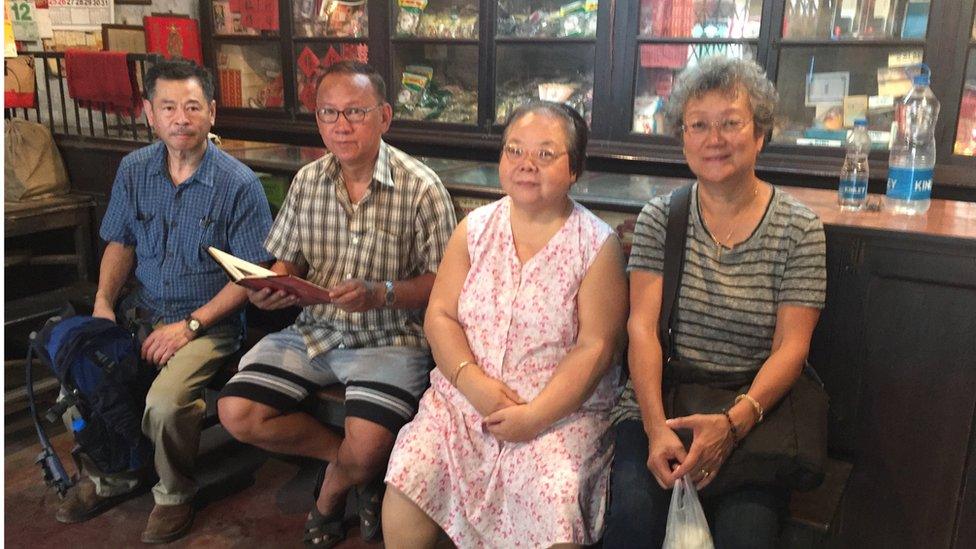
When they were released, Michael Cheng (extreme left), Yin Marsh (extreme right) eventually left India
As the world ushered in the Year of the Monkey, the eastern Indian city of Kolkata (Calcutta) also had its own Chinese New Year Parade.
That's only fitting.
Kolkata is home to India's only Chinatown, complete with soy sauce factories, ornate temples and tiny clubs where old men play mah-jong.
Even as recently as 10 years ago there were 25 dragon dance troupes in Kolkata. Now there are barely five. The Chinese have been leaving steadily over the last few decades.
"We left the country because of mistrust," says Michael Cheng. "Otherwise today we might still be Indian."
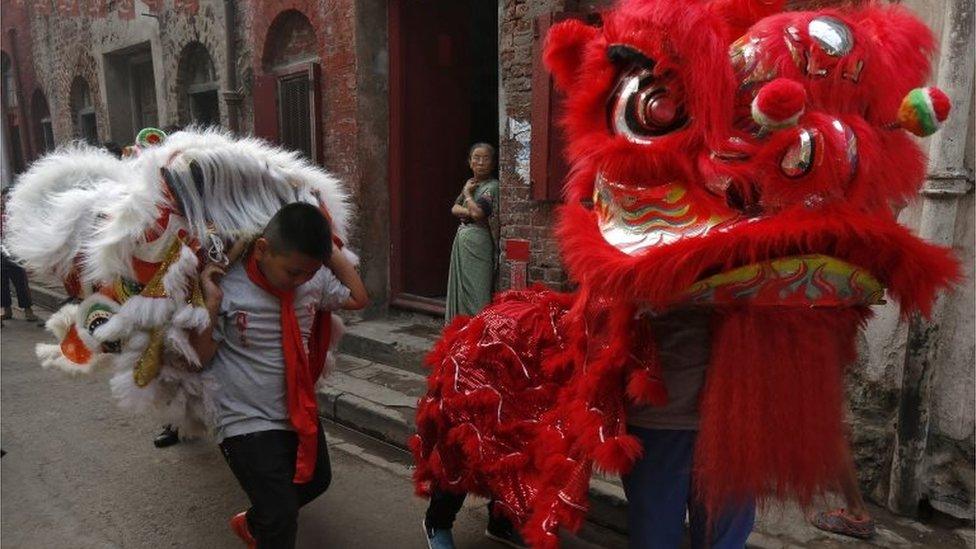
Chinese new year celebrations in Kolkata
Once a third-generation Indian, he is now a naturalized American citizen, living in North Carolina.
In 1962 when he was six, Mr Cheng and his family were taken from their homes in the hills of Darjeeling and bundled into a train that rumbled across India, the word "enemy" scrawled on its side, every compartment filled with befuddled and scared Chinese families.
They ended up in the dusty Deoli internment camp in the deserts of Rajasthan.
Once India's first Prime Minister Jawaharlal Nehru was imprisoned there by the British. Now Nehru's government was imprisoning some 3,000 Chinese residents of India.
India and China were at war for barely one month. But Mr Cheng languished in the camp for 22 months.
"Deoli-wallahs"
He was lucky. Some stayed over four years.
When they were released, the family was not allowed to go back to Darjeeling where his father ran a restaurant and a shoe business.
They were dumped in Kolkata, their movements severely restricted.
"They would not let us go back where we belonged. They would not let my parents go outside Kolkata to make a living. That was a slow killing," he says.
A few months ago Mr Cheng came back to India with some other "Deoli-wallahs" as they call themselves.
Yin Marsh was 13 when she went to the camp with her father and brother. She wrote a memoir about it - Doing Time with Nehru.
In August 1962 Steven Wen was in an Independence Day parade saluting the Indian flag. Three months later he was in Deoli.
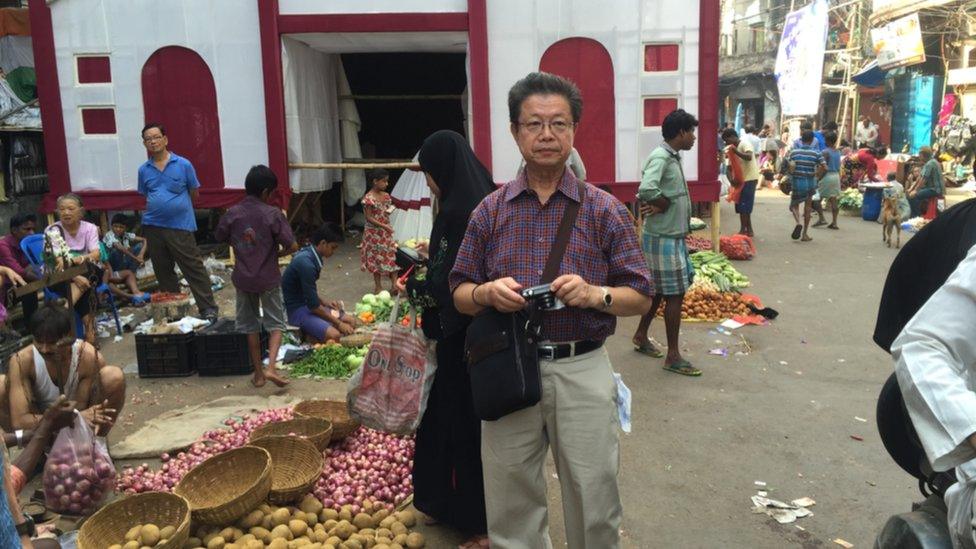
Steven Wen said he hid his Indian roots once he had left the country
Wen eventually left on a Taiwanese passport in 1969. For almost 50 years he didn't set foot in India or even admit to his Indian roots. He told everyone he was from Taiwan.
"If I said I was born in India it just reminded me of the humiliation I received," he says.
He is back on as much a fact-finding mission as an awareness-raising campaign.
Few Indians know about the Deoli camp or how the Defence of India Act of 1962 permitted detention in custody "of any person (suspected) of being of hostile origin".
Fewer know that Chinese people born before 1950 and living in India are still stateless, needing to renew a residence permit every year.
Traumatic memories
There has been no apology and no reparations. When the Association of India Deoli Camp Internees wrote a letter to then Prime Minister Manmohan Singh they got no response.
"Over 20 internees died in that camp. We would like to build something in remembrance," says Mr Wen.
Even the Chinese did not speak about Deoli for years. But that does not mean they do not remember.
"My identity card number is 880. My father is one number before me - 879," says Monica Liu, one of the few who stayed on in India.
Her restaurant, Beijing, in Kolkata's Tangra Chinatown, is always bustling, famous for its award-winning golden fried prawns.
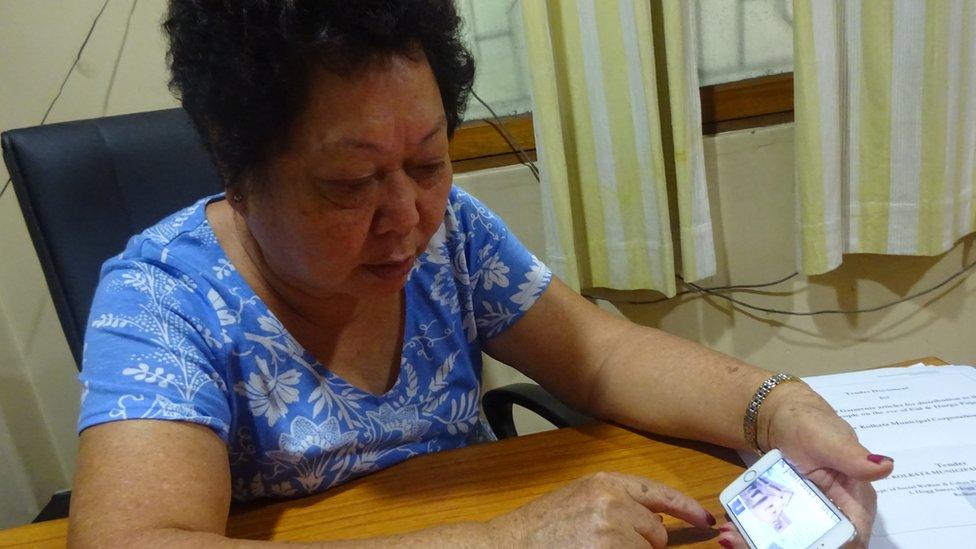
Ms Liu says although she has not forgotten what happened to the detainees she wants to move on
She owns five Chinese restaurants now and once opened an Indian restaurant in China. She runs a little empire from her office above the restaurant, barking orders at her managers in Hindi, meeting a stream of locals who want her help.
"I don't want to remember bad things that happened to us," she says. "But no one will forget."
When her family was detained, her grandparents in China stopped receiving remittances from her father. Her grandfather died, she says, of hunger.
She remembers a friend, unused to the desert heat, dying of sunstroke in the camp.
To this day, she cannot eat potatoes or bottle gourd. "For five and a half years I ate that only," she says. "I don't want to smell that even."
Camp life
The Deoli internees around today were children then and for some of them it was almost like an extended vacation.
Yin Marsh remembers the excitement when they were served meat once and the revulsion when they discovered it was camel. "There were things floating around - little tubes and bits of intestine," she says.
Mr Wen remembers growing watermelons and killing birds with a slingshot fashioned out of a rubber tire.
"Our favourite bird was pigeon - a great delicacy," he says, smiling for the first time. He remembers killing one, cleaning it and giving it away to the father of a girl he liked.
"I still remember the girl's name, Lee Foong," he says tears welling up. "I don't know where she is now. I just want to know how she is."
"Education was the biggest thing I lost," says Mr Cheng. The children had no blackboards and wrote on slates with chalk. "When I was released from camp I was three years behind everybody. I was never able to make it up."
There is little chance anyone will be "making it up" to them soon.
An Indian bureaucrat close to the Prime Minister's office told Yin Marsh that even with a new government in place, one not beholden to the memory of Jawaharlal Nehru and his descendants, an apology was unlikely.
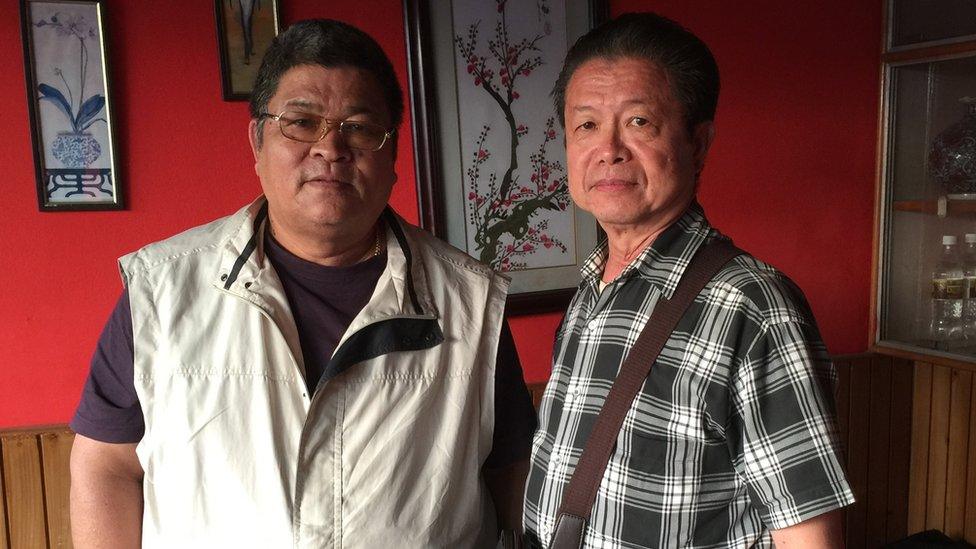
The Deoli internees around today were children then and for them it was almost like an extended vacation
A more plausible goal may perhaps be to re-evaluate residence permits for Chinese people born in India before 1950, or a monument or plaque acknowledging what happened in Deoli.
After returning from India, some of the former detainees are now setting up their own non-profit organisation with the help of an American lawyer.
The Indian government has said recently that those who could produce documents showing legal title to lost property could file claims.
Many had left their businesses in the hands of associates and neighbours they trusted, thinking they would be back in days or weeks. When they came back after years, neighbours shut their doors on them and old school friends greeted them with racist abuse.
But after all these years, Monica Liu is not sure what an apology will even achieve. It all feels like a "once upon a time" kind of story, she says.
"What is sorry?" she says. "Just a common word like a small wind blowing on your skin. Whatever we had is already gone."